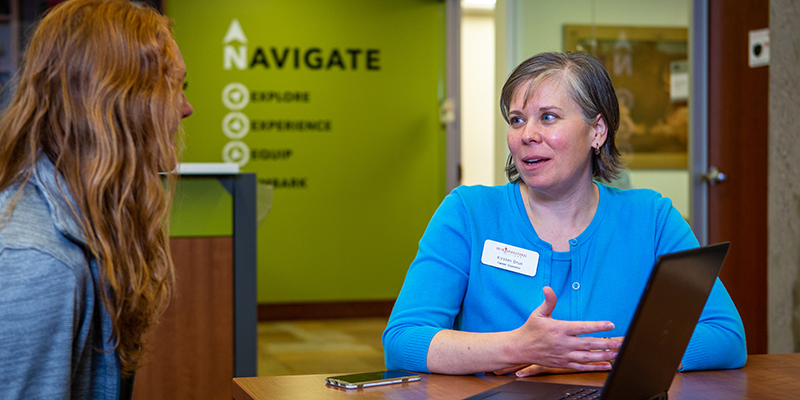Posted on

What’s one of the best ways to settle into college and start feeling at home? Get involved! Meeting other students and making friends can give you the support system you didn’t know you needed. But where do you even begin?
Step 1: Start with what feels right
You probably did a bunch of activities in high school: sports, clubs, volunteering, maybe even some leadership roles. Now is the time to focus on what truly matters to you. What lights you up? What challenges you in a good way? Don’t be afraid to let go of old stuff to make room for new experiences. You’re allowed to change—and to grow into someone new.
To help you identify and invest in your interests, the Compass Center for Career & Calling at Northwestern College offers PathwayU, an online assessment. This tool gives insight into your personality, strengths, and values and can give you ideas about the types of groups and activities you should pursue.
Step 2: Explore what’s out there
Check out your college’s website to see what clubs, groups and opportunities are offered. When you visit campus, keep an eye out for posters, fliers and bulletin boards advertising upcoming events. Ask around too. People love to share what they’re into, and you might find something unexpected that clicks with you.
From clubs and student government to faith groups and student events, Northwestern College’s campus life is full of opportunities to find “your people.”
Step 3: Go at your own pace
You know yourself best. If you’re super social, try joining something early on. If you’re more reserved, give yourself a little time to adjust. But don’t wait too long! Get involved in at least one thing during your first semester. Doing so can open doors, build your confidence, and help you meet people and feel like you belong.
Northwestern College’s annual fall Involvement Fair is a perfect place to learn about opportunities and talk with other students about their experiences in various clubs. All new students are strongly encouraged to check out the fair as a first step in getting involved.
Step 4: Take the leap
College is a fresh start, and it’s totally yours to shape. Say yes to the club that looks interesting. Show up at an event even if you don’t know anyone. Start that conversation; try that hobby; take that chance. Getting involved will help you discover new things about yourself and make memories that last. Remember: College isn’t something that happens to you. It’s an experience you create.
Northwestern College in Orange City, Iowa, is a place you can belong and be equipped for life. At Northwestern, you’ll gain a standout academic experience in a community where you’ll be noticed, accepted and valued. Learn more at nwciowa.edu and make plans to visit campus soon.
Posted on

Because math and science are the foundation of an engineer’s work, an engineering program with a faith focus might seem like an unusual combination. But who’s a better engineer to draw inspiration from than God, the creator of the universe?
If faith is important to you, here are a few reasons why a Christian-college engineering program might be the perfect fit:
-
You’ll explore engineering as a calling, not just a career.
At a Christian college, you’ll learn engineering principles in light of the gospel, helping you make connections between math, science and service to God and neighbor. Your professors will encourage you to view engineering as more than a job, but rather, as a calling from God to help make the world a better place.
-
You’ll build a strong ethical framework.
Throughout your engineering career, you’ll be asked to make decisions that directly impact people’s lives, communities and the environment. A Christian engineering program will affirm and strengthen your core values so you’ll feel equipped to make those decisions without compromising your beliefs—and with the common good in mind.
-
You’ll receive personal attention and mentorship.
Christian colleges tend to be smaller in size, enabling professors to build meaningful relationships with their students and allowing you to bond more easily with classmates. At Northwestern College, you’ll have an engineering adviser who is a Christian and can help you meet your career goals by connecting you with internships, tailoring your class schedule, and providing a listening ear as you navigate life as a college student.
-
You’ll experience a supportive Christian community.
A small Christian engineering program also lends itself to a tight-knit community of future engineers who share your values. You’ll grow close to each other as you collaborate on projects, brainstorm ideas, solve problems and encourage one another through challenging engineering coursework. These relationships could lead to valuable connections in the professional world—not to mention lifelong friendships!
Northwestern College, Iowa’s Standout Christian College, offers an engineering major with concentrations in mechanical, civil, electrical and computer engineering. The program is designed to achieve ABET accreditation in 2028 and is led by Dr. Young-Ji Byon, an experienced engineering educator who is training to become an ABET program evaluator later this year. Engineering students receive hands-on learning through regional internships and experiences with 3D printing, wooden bridge building, machining, programming, surveying, geographic information system mapping, traffic simulation and more.
Posted on

Strong clinical skills are essential to being a good nurse, but the best nurses also know how to build relationships, listen to patient needs, and advocate for patients and their families. Earning your nursing degree at a Christian college will help you develop all those skills and more, including the ability to care for the whole patient—mind, body and soul.
Here are five additional reasons to consider a Christian nursing program:
Knowing how to care for the whole patient will set you apart.
At a Christian college, you’ll be challenged to consider your patients’ emotional and spiritual well-being, as well as their physical symptoms. Your professors may point you toward the Bible’s countless stories of healing for direction on how to be a loving, compassionate care provider. Understanding a patient’s care beyond his or her physical needs will also set you apart when applying for nursing jobs.
Learn how to be a Christ-like advocate.
Navigating the health care system can be challenging for patients and their families, especially when they or someone they love is sick and in pain. A Christian nursing program will equip you to listen well and show compassion. It will also teach you to respectfully advocate for your patients’ needs with their doctors. You’ll learn how to bridge the gap between a patient’s concerns and medical knowledge.
As a nursing student at Northwestern College, you’ll gain 700+ hours of diverse clinical experiences, including serving at-risk populations during an off-campus, cross-cultural health experience.
Reflect on your vocation as a nurse.
If you want to become a nurse because you care about other people and want to help make their lives better, you probably already know that nursing is more than a job; it’s a calling. A Christian nursing program will help you explore and affirm that calling, deepening and strengthening it for the times when your career challenges you or breaks your heart.
At Northwestern College, freshmen headed into nursing take a course that encourages them to explore their call to nursing. As sophomores, nursing majors learn about biblical shalom—or health, wholeness and peace—within the context of nursing. This concept is re-visited in a senior nursing course to help them fully grasp their potential impact on patients and the kind of nurse they will be.
Receive personal attention and mentoring from faculty.
Because Christian colleges tend to be smaller in size, you’ll likely be part of a close-knit cohort with more opportunities for one-on-one interaction with your nursing professors. Northwestern nursing cohorts average between 25 to 30 students, while some state universities admit more than 150 students to each cohort. To give students an even more personalized learning experience, clinicals at Northwestern typically have a student-to-faculty ratio of 6:1.
Another benefit of studying nursing at Northwestern: You and your classmates will travel together to off-campus clinical sites—something most colleges don’t arrange.
Go on a medical mission and serve God’s people.
Studying nursing at a Christian college could open doors to medical mission opportunities, an excellent way to gain health care experience in environments with limited resources. Northwestern College students can serve on a medical mission in the U.S. or abroad as part of a 10-day Spring Service Partnership or 10-week Summer of Service. A partner program in Tanzania introduces students to the African country’s health services, language and culture through site visits to a hospital, an orphanage and rural HIV clinics.
The Northwestern College nursing program prepares students to be compassionate care providers who see every patient as a child of God. For the last five years, Raider nursing grads have achieved a 100% pass rate on their nursing board exams. They now serve at nationally recognized hospitals and clinics such as Duke Children’s Hospital, Mayo Clinic and Sanford Health.
Posted on

Attending a small college may not sound as exciting as a large university, but a few hidden perks could change your mind. Large universities may boast bigger facilities and more major offerings, but with tens of thousands of students, they can’t offer a tight-knit college community where faculty and staff know students by name.
Don’t miss these other benefits of studying small:
Be known + valued.
At a college of 3,000 students or less, you’ll take classes with fewer students—giving you the opportunity to learn your classmates’ names and actively participate in discussions. Manageable class sizes also allow professors to develop relationships with their students, so they’ll be more likely to meet outside of class to offer advice and answer questions. And since they’ll know you well, profs will be able to write specific, meaningful letters of recommendation for you as you apply for jobs or graduate programs.
What do students love most about Northwestern College? Belonging to a community and learning from professors who genuinely care about their success. With a student-faculty ratio of 15:1, students describe their classes as “1:1 tutoring in a classroom setting.”
Live in community.
A There’s more to a dorm experience than four walls and a bunk bed. It’s also about making connections and having fun! Smaller colleges tend to be more intentional about building community in the dorms, so you’ll get to know the people you live with beyond just sharing living space.
At Northwestern College, dorms are not exclusive to freshmen. In fact, many upperclassmen choose to stay in the dorms after their freshman year, forming relationships with students across class years.
Enjoy small-town hospitality.
For students seeking a “home away from home,” the bustle of a big city can’t compare to a supportive college community and some down-home hospitality. Small-town colleges are usually located in rural or suburban areas, where residents love to cheer for their local teams, attend college concerts and theatre productions, and host students for home-cooked meals.
It’s not uncommon for Northwestern professors to meet students for coffee or invite them into their homes for a meal. They—along with members of the Orange City community—are committed to helping students thrive by supporting their launch into adulthood.
There’s room to be flexible.
Another benefit of attending a small college is having greater freedom to design the course of study that is right for you. If you have more than one academic interest, your adviser may be able to work with other departments to waive or substitute certain course requirements so you can pursue multiple paths of study—or develop your own interdisciplinary major—and still graduate on time. With less competition for spots in a class, it will also be easier to take the classes you need when you need them.
Be supported to pursue your passions.
On a smaller campus, professors, coaches, and music/theatre directors are better equipped to communicate with each other and accommodate your diverse interests. If you’re a gifted athlete, coaches may offer you the flexibility to split your time between two varsity sports. Professors will support your pursuits in the performing arts, helping you make up the classwork you miss while touring with a musical group or attending a theatre festival.
Unlike large universities where students commit to a single activity, Northwestern students are putting their God-given talents to work across campus—often at the encouragement of faculty and staff.
Experience all these small-college benefits and more at Northwestern College in Orange City, Iowa. Our campus community will value your unique gifts and encourage you in the pursuit of your goals. Visit campus to find out why 9 in 10 freshmen feel a sense of belonging after just a few weeks.
Posted on

Selecting a college major can feel a little overwhelming: You’re about to pick something that could shape the next few years of your education and your future career. With some thought, self-reflection and research, however, you’ll be able to make a choice that feels right for you. Here are some tips to help guide you:
Start with your interests and strengths.
It may seem obvious, but think about what you love to do. What do you enjoy learning about? What are your hobbies and passions? Your interests are a great place to start, because they can help point you toward a major you’ll find engaging and fulfilling. Also, consider the school subjects in which you excel. When choosing a major, you’ll want to pick something that both excites you and plays to your strengths.
Northwestern College’s Compass Center for Career & Calling offers PathwayU assessments that will give you insights into your personality, strengths, interests and values.
Explore potential careers.
A major isn’t just an academic discipline; it’s a stepping stone to your future career. Think about what kind of work you can see yourself doing after college. Some majors are directly tied to specific jobs—such as accounting, engineering or nursing—while others, like psychology or social enterprise, might lead to a variety of career paths. As you research careers, find out what majors lend themselves well to the roles you’re interested in.
Northwestern’s PathwayU assessments will suggest possible career matches based on your answers. The Compass Center also has resources with information about what different jobs entail, their earning potential, and their projected growth.
Be open to change.
Many college students change their major at least once. You don’t need to have everything figured out before you step onto campus. Sometimes, exposure to new subjects and experiences can shift or refocus your perspective.
An estimated 20% to 50% of students enter college undecided about their major. At Northwestern College, if you’re one of them, you’ll be assigned a career counselor who will serve as your adviser, help you register for classes, and guide you in selecting a major.
Talk to those who know you.
Don’t be afraid to ask for advice! Your parents, teachers and school counselors are great resources, as they can offer insights into your strengths and weaknesses and might even suggest careers or majors you hadn’t considered. College advisers are also experts at guiding students through the process of choosing a major and can help you understand how your academic interests translate into real-world careers.
Consider the long-term outlook.
While it’s important to follow your passion, you also need to think about future career opportunities. Some fields have a higher earning potential or stronger job security. Others might not offer as high of a salary but will still lead to the satisfaction of serving others or doing what you love.
Trust yourself.
Finally, remember that this decision is yours to make. College is a time for growth and exploration, so trust yourself to make the best choice based on what you know now. You might not have everything figured out yet, and that’s OK. No matter what major you choose, it’s your ability to learn, adapt and grow that will ultimately shape your future.
A Northwestern College education will teach you to think critically, write clearly and speak articulately—invaluable skills no matter what career you pursue. The ability to learn is the most important quality you can have when facing this ever-changing world.
Posted on

If you're thinking about a major in education, whether elementary or secondary, you’ve got a lot of options—but a Christian college might be the right choice for you.
Take Marshall Kleinhesselink, a recent grad from Northwestern College who now teaches science and coaches football at a public high school. For him, the Christian college experience was life-changing. “A Christian education teaches you to use your gifts for God’s glory,” he says, “and to impact the people around you.”
Here are five reasons to consider a Christian college for your education degree:
1. You’ll discover your God-given gifts.
Christian colleges help you recognize your unique talents and teach you how to use them to make a difference. Whether it’s connecting with students or finding creative ways to teach, your gifts matter, and you'll learn how to use them for good.
2. You’ll learn to care for yourself and others.
Teaching is about more than lessons—it’s about showing love, patience and kindness. At a Christian college, you’ll explore how to bring these values into the classroom while learning how to care for yourself and avoid burnout.
3. You’ll get real-world skills for managing expectations.
Teaching can be tough, but at a Christian college, you’ll learn to manage the challenges and stay motivated. Professors understand that teaching is a calling and will help you navigate the demands with a positive mindset.
4. You’ll prepare to serve.
Teaching isn’t just about giving assignments; it’s about serving your students. You’ll be taught to lead with kindness, encourage others, and inspire those “aha” moments in the classroom. Your professors will show you how to approach teaching with a servant-leader mindset.
5. You’ll build a caring community.
One of the best parts of a Christian college is the tight-knit community. You’ll be surrounded by classmates and professors who share your values, support you through your journey, and cheer you on as you become a teacher.
If you want to live out your faith while making a difference as a teacher, a Christian college could be the perfect fit. You’ll grow in both your education and your faith, building skills to serve your students, manage teaching challenges, and connect with a supportive community.
Northwestern College, Iowa’s Standout Christian College, has a long history of producing award-winning teachers and ranks #1 in Best Colleges for Education in Iowa by Niche.com. We offer majors in elementary education, secondary education, special education teaching and education studies. Check us out!
Posted on

The college search process can feel like a rollercoaster ride for both parents and high school students. It's an exciting, yet stressful, time that will shape your son or daughter’s future. As a parent, it's common to feel the weight of helping your child navigate this crucial decision.
To help you on this journey, here are some key do’s and don’ts for parents during the college search process. These tips will help you strike the right balance between providing guidance and giving your child the independence they need to make a decision.
Do’s
1. Be a supportive sounding board.
Your role is to listen and offer advice when asked, knowing it’s essential to let your child lead the decision-making process. Create a calm environment for open discussions, where your child feels comfortable sharing their thoughts and concerns. Respect their unique perspective and remember that this is ultimately their journey.
2. Help research college options.
With thousands of colleges to choose from, it can be difficult for students to know where to start. Help them narrow down their options by focusing on key factors such as size, academic programs, location, campus culture, and faith emphasis (if that’s important to your child). Together, look at websites, visit campuses and encourage your child to explore schools that meet their academic, social and extracurricular interests.
The college search website Niche is a great resource to help you find colleges that check the boxes on your student’s college wish list. If you’re looking for a Christian college with strong faith and standout academics, be sure to check out Northwestern College.
3. Foster open communication.
Maintaining open communication throughout the search is key. Let your child know that you’re there to talk—whether they’re feeling overwhelmed, excited or uncertain. Regular check-ins can help you stay in the loop about their thoughts and progress while giving them the space to process things in their own time.
4. Set a realistic budget.
College tuition can be a big investment, so it’s important to have a clear understanding of what’s feasible from a financial standpoint. Have an honest discussion about your family’s budget as well as the need for financial aid, scholarships and/or student loans. This helps your child make decisions that are financially responsible while also exploring schools that offer the features they want. Keep in mind that the “sticker price” in most cases will be reduced by scholarships from the college, and you’ll want to compare the bottom line before your student makes a final decision.
At Northwestern College, 100% of students receive financial aid. In fact, we guarantee that your student, if accepted, will receive at least $15,000 in scholarships and grants upon enrollment. For more information on Northwestern’s affordable Christian education, visit nwciowa.edu/financial-aid.
5. Respect your child’s independence and preferences.
It’s important to remember that your child is growing into an adult, and this is a big decision for their future. Respect their wishes, even if they differ from your expectations. Whether it’s about the size of the school, its location, or its academic programs, support your child in finding a college that’s a good fit for them.
Don’ts
1. Don’t overwhelm your child with too much information.
The vast amount of information about colleges can be overwhelming. As a parent, it’s tempting to bombard your child with lists of schools, rankings and brochures. Instead of pushing your child in a dozen different directions, try to help them focus on schools that align with their goals and interests.
2. Don’t push your alma mater (or your own preferences) too hard.
While it’s natural to want your child to attend the same school you did, avoid imposing your own preferences. Just because your alma mater might have been the perfect fit for you doesn’t mean it will be right for your child. Let your child explore options that feel right for them, rather than feeling pressured to follow in your footsteps.
3. Don’t make it about you.
It’s easy to focus on your desires during the college search—how proud you’ll be, what your friends will think, or which school looks the best on paper. But the decision should center around your child’s needs and aspirations, not your own. Keep the focus on their future and not yours.
4. Don’t micromanage the process.
It’s important that your child takes ownership of the search. While it’s OK to ask questions of your own or offer your student reminders, avoid taking over the process. Allow your child to fill out forms, write their essays and meet deadlines. It’s an opportunity for them to build independence and learn valuable life skills.
5. Don’t make decisions for them.
Ultimately, the choice of where to attend college should be made by your child, not by you. While you can provide valuable perspective and logistical support, it’s important that your child makes the final decision. This is a significant moment in their life, and they need to feel ownership over it.
The college search is a journey of growth and discovery—for both parents and students. By following these do’s and don’ts, you can help your child find a college that fits their needs and empowers their future. The most important thing is that they feel confident in their choice, knowing you’ve been there to support them every step of the way.
Northwestern College, Iowa’s Standout Christian College, is a place your student can belong and be equipped for life. At Northwestern, your child will have a standout academic experience in a community where they’ll be known and valued. Learn more at nwciowa.edu.
Posted on

Visiting a college campus is like getting a sneak peek into your future. You’ll get to see, hear, taste and touch all that the college has to offer. These experiences will then help you decide where you want to start building your future. Be sure to include these things on your campus visit itinerary:
See where you’ll be living
College will be more than just a school; it will be your home. Ask to see a dorm room or other living options on campus. Better yet, ask if you can stay overnight. Tour the spaces where you will be spending most of your time. Think about your personality and lifestyle. Do you plan to do most of your studying in the library? Will you want to work out in the rec center? Are there places you can hang out with friends?
Hear from faculty + students
Your academic experience is one of the most important things to consider. Schedule a time to meet with a professor in an area of study you’re interested in. Ask if you can talk with some current students in that major and get their perspective on why the school is the best choice in your field. Don’t be shy. This is the time to come prepared with your best questions—and lots of them. The more you can learn from faculty and students, the better you’ll be able to decide if that college is the right fit for you.
Get in touch with the culture
Beyond academics, colleges offer so many ways for you to grow, expand your interests and participate in the community. Catch a sporting event, go to a concert, or learn what clubs and organizations are available.
When visiting a Christian college, make time to attend chapel and learn more about faith-based groups and spiritual growth opportunities. At Northwestern College, there are many options for worship with other students. Come on Sunday night for our student-led Praise + Worship service, or visit a Tuesday or Friday chapel featuring messages by faith leaders from across the country, as well as our faculty, staff and students.
Bring your appetite
Brain food is a real thing. To learn well, you need to eat well. Visit the cafeteria and get a taste of what your meal options will be. Ask about other food offerings and accommodations for special diets. Do they have other locations where food is available on campus? Are there coffee shops or any special treats for students (like Warm Cookie Wednesdays at Northwestern)? What nearby dining options are available for those times you want to get off campus with friends?
Explore financial aid
Be sure to talk with college staff about costs, scholarship opportunities and potential loan options. Many schools are working hard to make the investment in your future more affordable. At Northwestern, every accepted student receives at least $17,000 per year in scholarships or grants. That amount will grow depending on your GPA, athletic, esports or performing arts participation, as well as your potential to contribute to Northwestern’s mission through your leadership and involvement. Regardless of your family’s income or your academic achievements, you will gain your best knowledge about real costs and payment options by meeting with an expert in this area.
As you plan your college visits, we’d love for you to make a stop in Orange City, Iowa, to experience Northwestern College for yourself. Schedule an individual visit or sign up for a Raider Day and join others in spending time on our beautiful campus.
Posted on

As you look toward embracing the college lifestyle, you might be wondering what you need to know to survive—and thrive—as an incoming freshman. We asked current college students what they wished they had known starting out, and they shared some great advice:
Your roommate might not be your best friend. And that’s OK.
You’ve probably heard the “roomie romance” story before: roommates turned best friends turned attendants in each other’s weddings. It’s not complete fiction—your roommate could become your built-in college bestie! But it’s also OK if your roommate is just someone you share a room with.
Keep the door to your dorm room open.
If you live in a residence hall that encourages connecting with others, consider leaving the door to your dorm room open so that fellow residents feel welcome to stop by and chat. Not only will you get to know the people living closest to you, but you might also make some new friends!
Niche.com ranks Northwestern College as having the best college dorms in the country. Each residence hall is staffed by a full-time resident director and has its own close-knit community and annual traditions.
Don’t procrastinate.
Instead of waiting until the last minute to finish an assignment or cram for an exam, do yourself a favor and prioritize your studies. Use a planner or the notes app on your phone to keep track of deadlines and test dates. Set aside non-negotiable study times and go somewhere you know you won’t be distracted.
Need some homework help? Northwestern’s Student Success Center has 150+ student tutors who offer free academic support in every subject area.
Ask lots of questions and use campus resources.
Your questions can almost always be answered—you just have to ask them! Learn about the support services your college offers, such as on-campus health care and/or counseling, career development services, tutoring, and accessibility accommodations. Then when you need additional support, you’ll know exactly who to turn to.
In addition to free tutoring, Northwestern provides free, confidential counseling services. You can also get help applying for internships, writing a resume and cover letter, learning key interview skills, and more at our Compass Center for Career & Calling.
Get involved!
Another good way to make friends is to get involved with activities you enjoy. Join a club. Play a sport, esports or intramurals. Audition for a theatre production or music ensemble. And whenever you can, attend student life events.
At Northwestern, you may even earn a scholarship for your involvement in athletics, esports, music, theatre or worship arts.
Know that you’re not alone.
Your first year of college is a major adjustment, but remember that every other freshman is in the same boat as you. Whenever you’re struggling, try sharing your concerns with a freshman or upperclassman friend. It’s likely that he or she will understand what you’re going through and may even be aware of resources that could help.
Do you want a college environment where you’ll be loved, known and cared for? Check out our website to learn more about Iowa’s Standout Christian College.
Posted on

While it might seem far into the future, your college days will be here before you know it! Junior year is a great time to launch your college search and begin making the most of your last two years of high school. Here’s what we recommend for getting started:
Decide what you want from your college experience.
Are you interested in attending a large, public university or a small, private college? Do you want to attend a Christian college where there will be more opportunities for spiritual growth and development? Are you looking for a school with strong athletic or performing arts programs? Make a list of things that are important to you so you know how well your college options measure up.
Begin your online search.
Check out college websites and learn more about their academic programs, extracurricular activities, campus life, student activities, and mission and values as an institution. College-search resources like Niche can provide a helpful overview of the schools you’re most interested in.
Visit your high school counselor.
Ask your school counselor about upcoming college fairs or visits by college admissions reps. These are both excellent opportunities to talk to someone about the colleges you’re interested in, or even just to learn more about the admissions process. Your counselor might also have additional resources to share that could help you in your college search.
Get involved in high school activities.
Even while you’re thinking about the next stage in your education journey, don’t forget to enjoy high school! Participate in sports, esports, music, drama or any other school activity you think sounds fun. You may even have opportunity to pursue leadership roles such as president of the student council or editor of the school newspaper. Leadership experience looks GREAT on a college resume and might help you qualify for scholarships.
Northwestern College offers scholarships to standout students involved in athletics, esports, music, theatre, worship arts, mission and more. Visit our scholarships page >>
Estimate your financial need.
Many colleges offer a net price calculator that estimates how much federal, state and institutional financial aid you could receive. This can help you prepare for any out-of-pocket expenses that will need to be covered with private loans, outside scholarships or savings. Also, be sure to research scholarship opportunities offered through your school, church or other service organizations in your community—and make a note in your calendar of when you should apply as a senior.
100% of Northwestern College students receive financial aid, including at least $17,000 per year in Northwestern scholarships and grants.
Take the ACT or SAT.
Many colleges are now test-optional, so taking the ACT or SAT may not be an admissions requirement. Northwestern College is test-optional, but we still encourage students to take the ACT/SAT and offer a scholarship bonus of up to $1,500, depending on your score. And if you qualify to apply for our Honors Program, you could receive an additional $1,500 that’s renewable each year that you remain in the program.
Start earning college credit.
Get a jumpstart on your college course schedule by taking dual-credit courses that give you both high school and college credit. These courses often meet general education requirements, enabling you to start taking courses in your college major sooner. And if you’re a strong student, consider taking Advanced Placement (AP) courses in your best subjects. A high score on an AP exam might help you “test out” of certain college requirements.
Learn more about transferring your college credits to Northwestern. >>>
Go on college visits.
The best way to get a sense of what a college has to offer is to visit campus and check things out for yourself! Many colleges have visit days that are tailored specifically to high school juniors, so ask your top college choices if they have that visit option. And be sure to check out our list of questions to ask your college tour guide!
Attend one of Northwestern’s Raider Days this fall! You’ll get to tour campus; attend chapel; eat in our cafeteria; learn about financial aid; and meet students, professors and coaches.

